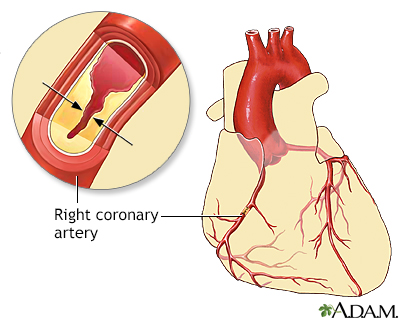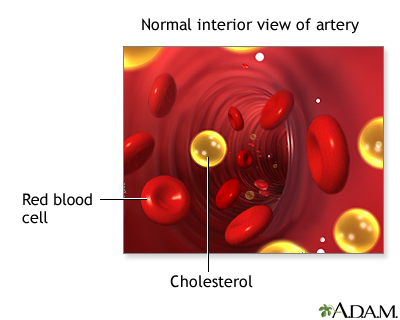High blood cholesterol levels
Cholesterol - high; Lipid disorders; Hyperlipoproteinemia; Hyperlipidemia; Dyslipidemia; Hypercholesterolemia
Cholesterol is a fat (also called a lipid) that your body needs to work properly. Too much bad cholesterol in your blood can increase your chance of getting heart disease, stroke, and other problems.
Common medical terms for high blood cholesterol are lipid disorder, hyperlipidemia, or hypercholesterolemia, with the last being the most precise.
Images




Causes
There are many types of cholesterol. The ones talked about most are:
- Total cholesterol -- all the cholesterols combined
- High density lipoprotein (HDL) cholesterol -- often called good cholesterol
- Low density lipoprotein (LDL) cholesterol -- often called bad cholesterol
For many people, abnormal cholesterol levels are partly due to lifestyle choices. This often includes eating a diet that is high in fat. Other lifestyle factors are:
- Being overweight
- Lack of exercise
Some health conditions can also lead to abnormal cholesterol, including:
- Diabetes
- Kidney disease
- Polycystic ovary syndrome
- Pregnancy and other conditions that increase levels of female hormones
- Underactive thyroid gland
Medicines such as certain birth control pills, diuretics (water pills), beta-blockers, and some medicines used to treat depression may also raise cholesterol levels. Several disorders that are passed down through families lead to abnormal cholesterol and triglyceride levels. They include:
- Familial combined hyperlipidemia
- Familial dysbetalipoproteinemia
- Familial hypercholesterolemia
- Familial hypertriglyceridemia
Smoking does not cause higher cholesterol levels, but it can reduce your HDL (good) cholesterol.
Exams and Tests
A cholesterol test is done to diagnose a lipid disorder. Different experts recommend different starting ages for adults.
- Recommended starting ages are between 20 to 35 for men and 20 to 45 for women.
- Adults with normal cholesterol levels should have the test repeated every 5 years.
- Repeat testing sooner if changes occur in lifestyle (including weight gain and diet).
- Adults with a history of elevated cholesterol, diabetes, kidney problems, heart disease, and other conditions require more frequent testing.
It is important to work with your health care provider to set your cholesterol goals. Newer guidelines steer providers away from targeting specific levels of cholesterol. Instead, they recommend different treatments or medicines and doses depending on a person's history and risk factor profile. These guidelines change from time to time as more information from research studies becomes available.
General targets are:
- LDL: Less than 100 mg/dL (2.59 mmol/L) - lower numbers are better
- HDL: 60 mg/dL (1.55 mmol/L) or higher - higher numbers are better
- Total cholesterol: Less than 200 mg/dL (5.18 mmol/L) - lower numbers are better
- Triglycerides: Less than 150 mg/dL (1.69 mmol/L) - lower numbers are better
If your cholesterol results are abnormal, you may also have other tests such as:
- Blood sugar (glucose) test to look for diabetes
- Kidney function tests
- Thyroid function tests to look for an underactive thyroid gland
Treatment
Steps you can take to improve your cholesterol levels and to help prevent heart disease and a heart attack include:
- Quit smoking. This is the single biggest change you can make to reduce your risk of heart attack and stroke.
- Eat foods that are naturally low in fat. These include whole grains, fruits, and vegetables.
- Use low-fat toppings, sauces, and dressings.
- Avoid foods that are high in saturated fat.
- Exercise regularly.
- Lose weight if you are overweight.
Your provider may want you to take medicine for your cholesterol if lifestyle changes do not work. This will depend on:
- Your age
- Whether or not you have heart disease, diabetes, or other blood vessel problems
- Whether you smoke or are overweight
- Whether you have high blood pressure or diabetes
You are more likely to need medicine to lower your cholesterol:
- If you have heart disease or diabetes
- If you are at high risk for heart disease (even if you do not yet have any heart problems)
- If your LDL cholesterol is 190 mg/dL (4.92 mmol/L) or higher
Almost everyone else may get health benefits from LDL cholesterol that is lower than 160 to 190 mg/dL (4.14 mmol/L to 4.92 mmol/L).
There are several types of medicines to help lower blood cholesterol levels. The medicines work in different ways. Statins are one kind of drug that lowers cholesterol and has been proven to reduce the chance of heart disease. Other medicines are available if your risk is high and statins do not lower your cholesterol levels enough. These include ezetimibe and PCSK9 inhibitors.
Outlook (Prognosis)
High cholesterol levels can lead to hardening of the arteries, also called atherosclerosis. This occurs when fat, cholesterol, and other substances build up in the walls of arteries and form hard structures called plaques.
Over time, these plaques can block the arteries and cause heart disease, stroke, and other symptoms or problems throughout the body.
Disorders that are passed down through families often lead to higher cholesterol levels that are harder to control.
Related Information
Triglyceride levelAtherosclerosis
Hypothyroidism
Cushing syndrome
Acute kidney failure
Alcohol use and safe drinking
Overweight
Coronary heart disease
Stroke
Cholesterol - what to ask your doctor
Type 2 diabetes - what to ask your doctor
Cholesterol - drug treatment
Diabetes - preventing heart attack and stroke
Angina - discharge
Heart attack – discharge
Angioplasty and stent - heart - discharge
Aspirin and heart disease
Being active after your heart attack
Being active when you have heart disease
Butter, margarine, and cooking oils
Cardiac catheterization - discharge
Heart pacemaker - discharge
Cholesterol and lifestyle
Antiplatelet medicines - P2Y12 inhibitors
Controlling your high blood pressure
Heart bypass surgery - discharge
Heart bypass surgery - minimally invasive - discharge
Dietary fats explained
Fast food tips
Heart disease - risk factors
How to read food labels
Low-salt diet
Mediterranean diet
Heart failure - fluids and diuretics
Heart failure - home monitoring
Stroke - discharge
References
American Diabetes Association Professional Practice Committee. 10. Cardiovascular disease and risk management: standards of care in diabetes-2025. Diabetes Care. 2025;48(Supplement_1):S207-S238. PMID: 39651970 pubmed.ncbi.nlm.nih.gov/39651970/.
Arnett DK, Blumenthal RS, Albert MA, et al. 2019 ACC/AHA Guideline on the primary prevention of cardiovascular disease: executive summary: a report of the American College of Cardiology/American Heart Association Task Force on Clinical Practice Guidelines. Circulation. 2019;140(11):e563-e595. PMID: 30879339 pubmed.ncbi.nlm.nih.gov/30879339/.
Genest J, Mora S, Libby P. Lipoprotein disorders and cardiovascular disease. In: Libby P, Bonow RO, Mann DL, Tomaselli GF, Bhatt DL, Solomon SD, eds. Braunwald's Heart Disease: A Textbook of Cardiovascular Medicine. 12th ed. Philadelphia, PA: Elsevier; 2022:chap 27.
Grundy SM, Stone NJ, Bailey AL, et al. 2018 AHA/ACC/AACVPR/AAPA/ABC/ACPM/ADA/AGS/APhA/ASPC/NLA/PCNA guideline on the management of blood cholesterol: executive summary; a report of the American College of Cardiology/American Heart Association Task Force on Clinical Practice Guidelines. J Am Coll Cardiol. 2019;73(24):3168-3209. PMID: 30423391 pubmed.ncbi.nlm.nih.gov/30423391/.
Robinson JG. Disorders of lipid metabolism. In: Goldman L, Cooney KA, eds. Goldman-Cecil Medicine. 27th ed. Philadelphia, PA: Elsevier; 2024:chap 190.
US Preventive Services Task Force; Mangione CM, Barry MJ, et al. Statin use for the primary prevention of cardiovascular disease in adults: US Preventive Services Task Force Recommendation Statement. JAMA. 2022;328(8):746-753. PMID: 35997723 pubmed.ncbi.nlm.nih.gov/35997723/.
US Preventive Services Task Force; Barry MJ, Nicholson WK, et al. Screening for lipid disorders in children and adolescents: US Preventive Services Task Force Recommendation Statement. JAMA. 2023;330(3):253-260. PMID: 37462699 pubmed.ncbi.nlm.nih.gov/37462699/.
BACK TO TOPReview Date: 1/1/2025
Reviewed By: Michael A. Chen, MD, PhD, Associate Professor of Medicine, Division of Cardiology, Harborview Medical Center, University of Washington Medical School, Seattle, WA. Also reviewed by David C. Dugdale, MD, Medical Director, Brenda Conaway, Editorial Director, and the A.D.A.M. Editorial team.

Health Content Provider
06/01/2025
|
A.D.A.M., Inc. is accredited by URAC, for Health Content Provider (www.urac.org). URAC's accreditation program is an independent audit to verify that A.D.A.M. follows rigorous standards of quality and accountability. A.D.A.M. is among the first to achieve this important distinction for online health information and services. Learn more about A.D.A.M.'s editorial policy, editorial process and privacy policy. A.D.A.M. is also a founding member of Hi-Ethics. This site complied with the HONcode standard for trustworthy health information from 1995 to 2022, after which HON (Health On the Net, a not-for-profit organization that promoted transparent and reliable health information online) was discontinued. |
The information provided herein should not be used during any medical emergency or for the diagnosis or treatment of any medical condition. A licensed medical professional should be consulted for diagnosis and treatment of any and all medical conditions. Links to other sites are provided for information only -- they do not constitute endorsements of those other sites. © 1997- 2025 A.D.A.M., a business unit of Ebix, Inc. Any duplication or distribution of the information contained herein is strictly prohibited.
